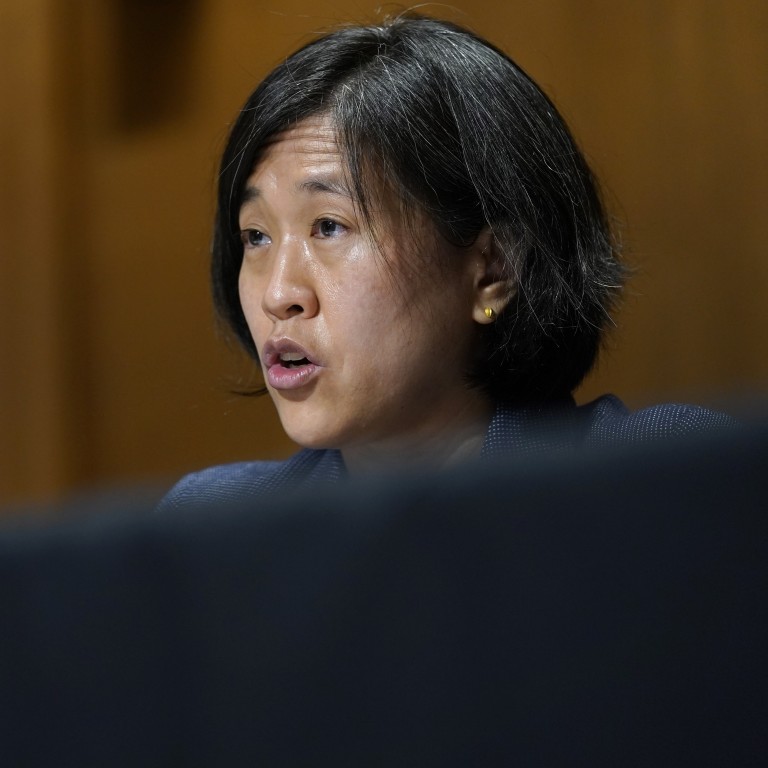
US, EU to hold China to account on ‘trade-distorting policies’
- United States and European Union said on Monday that they can partner to ‘hold countries like China that support trade-distorting policies to account’
- Statement issued by the US Trade Representative Katherine Tai, US Secretary of Commerce Gina Raimondo and European Commission executive vice-president Valdis Dombrovskis
The United States and the European Union issued a joint statement on Monday saying that they can partner to “hold countries like China that support trade-distorting policies to account”.
As the two sides started discussions on addressing global overcapacity in steel and aluminium, the European Union agreed to a partial truce with the US in a dispute over American metals tariffs imposed by former president Donald Trump.
The commission said on Monday it would suspend a proposed hike in its retaliatory tariffs that would have added a number of products, from lipstick to sports shoes, and doubled to 50 per cent the duties on US bourbon whiskey, motorbikes and motor boats.
In a joint statement, Brussels and Washington said that, as allies, they could promote high standards, address shared concerns.
As the United States and EU Member States are allies and partners, sharing similar national security interests as democratic, market economies, they can partner to promote high standards, address shared concerns, and hold countries like China that support trade-distorting policies to account
“Executive vice-president Dombrovskis, ambassador Tai, and secretary Raimondo acknowledged the impact on their industries stemming from global excess capacity driven largely by third parties. The distortions that result from this excess capacity pose a serious threat to the market-oriented EU and US steel and aluminium industries and the workers in those industries,” the joint statement said.
“They agreed that, as the United States and EU Member States are allies and partners, sharing similar national security interests as democratic, market economies, they can partner to promote high standards, address shared concerns, and hold countries like China that support trade-distorting policies to account.”
The discussions would aim to find solutions, such as on appropriate trade measures, by the end of the year.
The US will maintain its tariffs of 25 per cent on steel and 10 per cent on aluminium, which also apply to imports from China, India, Russia, Turkey, Norway and Switzerland.
To ensure the most constructive environment for these joint efforts, they agreed to avoid changes on these issues that negatively affect bilateral trade
The Trump administration cited US national security grounds in June 2018 as the basis for its metals tariffs – measures that steelmakers such as Thyssenkrupp and Voestalpine have said they were affected by.
“They agreed to enter into discussions on the mutual resolution of concerns in this area that addresses steel and aluminium excess capacity and the deployment of effective solutions, including appropriate trade measures, to preserve our critical industries. To ensure the most constructive environment for these joint efforts, they agreed to avoid changes on these issues that negatively affect bilateral trade,” the joint statement added.
“They committed to engaging in these discussions expeditiously to find solutions before the end of the year that will demonstrate how the US and EU can address excess capacity, ensure the long-term viability of our steel and aluminium industries, and strengthen our democratic alliance.”
Also on Monday, China announced it would extend tariff exemptions for 79 products imported from the US that were due to expire on Tuesday, its finance ministry confirmed.
The products include rare earth ore, gold ore, and silver ore and concentrate.
The exemptions will be extended until December 25, the finance ministry said.
The products originally received exemptions from retaliatory tariffs China imposed on US goods as countermeasures to US Section 301 actions.
China has previously extended exemptions made during rounds of tariffs between the world’s two biggest economies.

